
THERE’S another troubling development currently hounding authorities in Negros Occidental.
A recent series of raids and seizures has raised eyebrows, prompting a pressing question: Is Negros becoming a haven for cigarette smuggling?
Yours truly took time to speak with local authorities to get to the bottom of this issue.
No less than Colonel Rainerio de Chavez, director of the Negros Occidental Police Provincial Office (NOCPPO), admitted that the province’s vast coastline and increasing demand for cheap, untaxed cigarettes continue to pose serious challenges in curbing cigarette smuggling.
“The province’s extensive coastline and its geographical proximity to Mindanao make it vulnerable to smuggling activities,” De Chavez said.
He also pointed out that the growing market for lower-priced, tax-free cigarettes is fueling the persistence of the illicit trade.
According to police data, smuggling operations in the province often rely on pump boats and other small vessels to transport untaxed cigarettes from Mindanao to Negros. Dapitan, in Mindanao, is said to be the nearest jump-off point to the province.
“These boats navigate through under-monitored coastal routes,” De Chavez explained, “making detection a challenge.”
Apprehensions
On May 28, police seized P2.8 million worth of smuggled cigarettes in Barangay Pasil, E.B. Magalona.
According to Major Eric Doronila, the town’s police chief, the 150 boxes of contraband were reportedly bound for the upland villages of E.B. Magalona and neighboring areas.
Smuggled cigarettes are being sold in upland barangays for only P40 per pack — much cheaper than the P120 to P140 price tag for legitimate brands, police said.
The E.B. Magalona seizure was the third major anti-smuggling operation in Negros Occidental this year, bringing the total value of confiscated cigarettes to P17.6 million.
On May 19, police recovered P12.8 million worth of untaxed cigarettes in Sitio Bagambang, Barangay Tiling, Cauayan. This followed a February 12 raid in Barangay Isio, also in Cauayan, which yielded P2 million worth of smuggled goods.
Police records also indicate that over P8 million worth of illegal cigarettes were seized earlier this year from various operations in the cities of Escalante and Sagay and the towns of Ilog and Binalbagan.
Business Reaction
Alarmed by the volume of seized contraband, Frank Carbon, vice president of the Metro Bacolod Chamber of Commerce and Industry (MBCCI), voiced concern over the operations of a possible syndicate using Negros Occidental as a dumping ground for smuggled cigarettes.
“This must be stopped as soon as possible, or it may cast a negative image on Negros,” Carbon warned.
While he acknowledged that the direct impact on local businesses may be minimal, he stressed that the loss in excise tax revenue is significant.
Citing their independent monitoring, Carbon revealed that most untaxed cigarettes come from abroad, following the route: Mindanao–Palawan–Antique–Negros–Cebu.
Key Initiatives
In response to the growing threat, De Chavez said NOCPPO is now closely coordinating with the PNP Maritime Group to boost seaborne patrols.
He outlined several key initiatives to combat smuggling:
* Conduct of raids on suspected warehouses and storage facilities;
* Establishment of checkpoints in strategic areas to intercept contraband; and
* Closer coordination with the Provincial Law Enforcement Coordinating Council (PLECC) and other partner agencies for a unified enforcement strategy.
“Our mandate is clear,” De Chavez asserted. “We will not allow illegal trade to thrive in our province. NOCPPO remains committed to protecting both the economic interests and the health of our communities.”
Regarding the alleged syndicate behind these operations, he added, “NOCPPO is actively conducting investigations and surveillance to identify and arrest those responsible — regardless of their background or affiliations.”
A Stern Warning
Captain Ryenaldo Bauden Jr., head of the PNP Maritime Command in Negros Occidental, said that despite being understaffed with only 30 personnel, they are committed to fulfilling their mandate.
“May our recent successes in Cauayan and E.B. Magalona serve as a strong warning to the syndicates behind cigarette smuggling in Negros Occidental. It’s time for them to stop,” Bauden said.
Bad for Health, Bad for the Economy
Cigarette smuggling is a double-edged sword — harmful both to public health and to the economy.
The cheaper these cigarettes become in Negros Occidental, the greater the health risks for Negrenses.
This is a matter of public concern.
In my own reading, I came across a chilling statistic: the Philippines records over 87,600 smoking-related deaths every year.
Scary, isn’t it?
On the economic front, the Bureau of Customs reported P9.19 billion worth of smuggled cigarettes confiscated across the country in 2024 alone.
Just imagine how much tax revenue is lost from that amount — and how many underprivileged Filipinos could have benefited from those funds.
This question is especially relevant amid the current economic challenges facing the country.
Final Thoughts
Local authorities in Negros Occidental deserve commendation for their sustained efforts against cigarette smuggling. Their work is vital — for public health and for the nation’s economy.
I hope their campaign remains consistent and untainted by corruption.
Let us pray no civilian or police officer ever succumbs to the temptation of “kilkil” (bribery), which could undermine the integrity of these operations.
Let’s not deny that anti-smuggling efforts can be ripe with temptation.
Bribery is often part of the equation, and law enforcers are not immune.
But to NOCPPO’s credit, they are making a stand — fighting to curb illegal trade, safeguard lives, and help shore up the country’s tax revenues.
It’s a noble mission, though one not widely recognized.
So here’s to Col. De Chavez and his team: may their tribe continue to strike fear in the hearts of cigarette smuggling syndicates in Negros Occidental./PN







